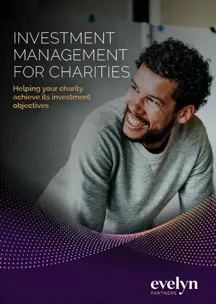

Guide: Charity investment management
Helping your charity achieve its investment objectives.
Every charity is unique, and trustees have a key responsibility to identify and implement the right investment approach. We work with executives and trustees to build bespoke portfolios that match each charity’s specific needs, values and changing objectives.
In this guide find out more about:
- Our robust approach to managing money
- How our specialist team builds investment portfolios to meet both financial and charitable objectives
- How we recognise ESG investing for charities
Download now.




